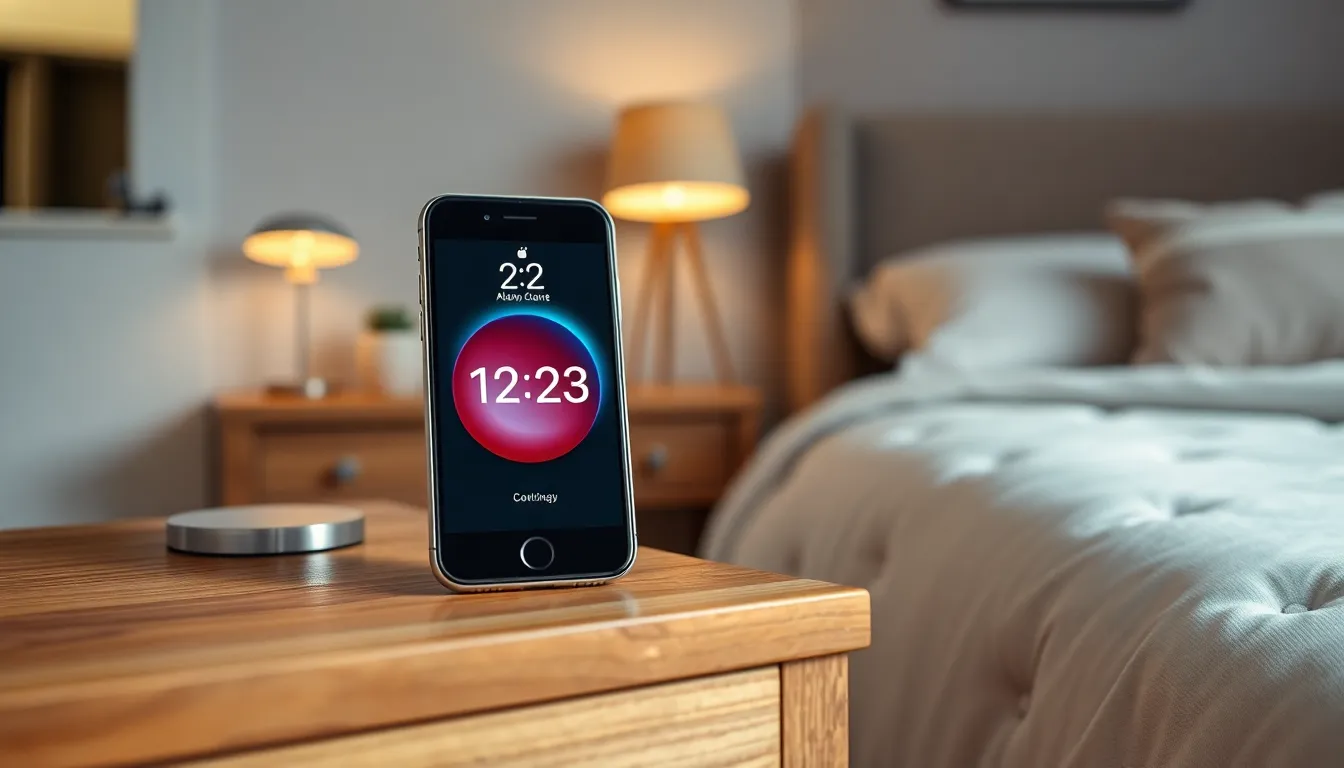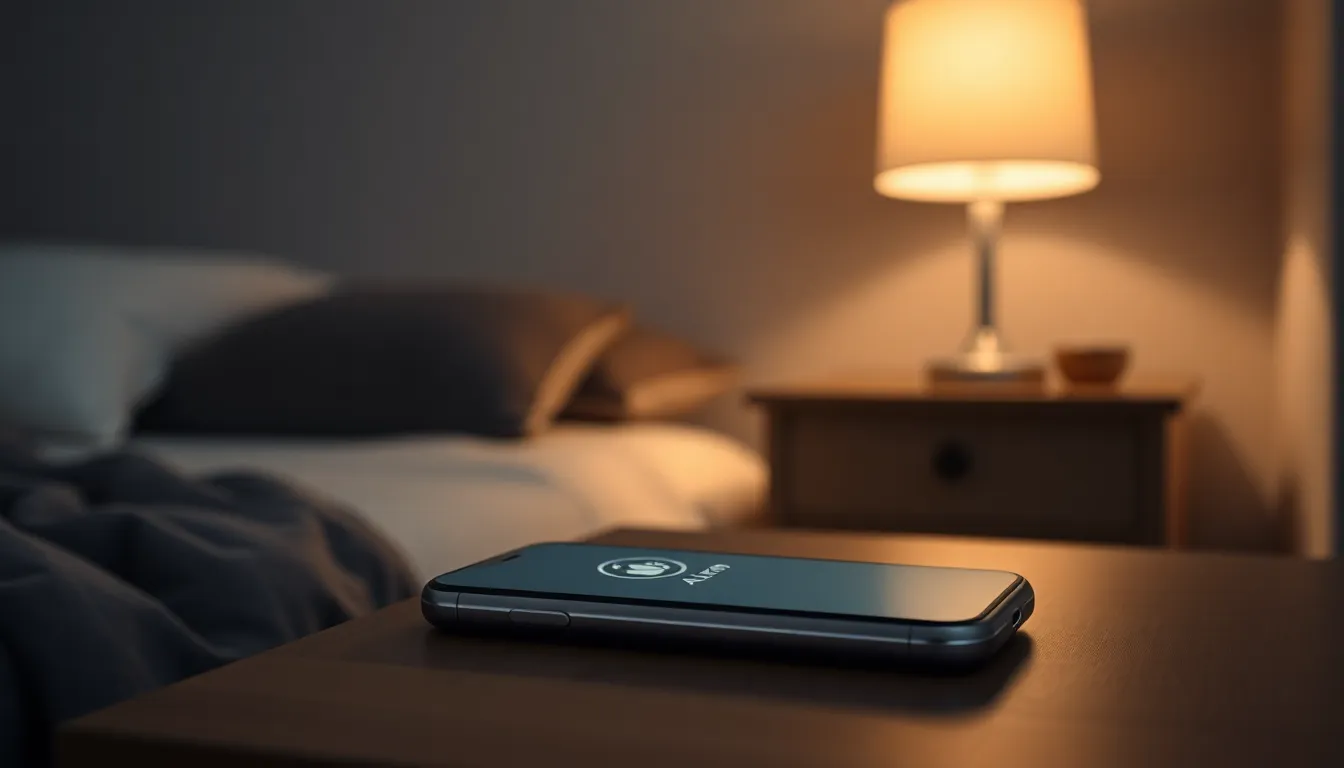Ever woken up in a panic, staring at your iPhone, wondering why your alarm decided to play hide and seek? You’re not alone. Many iPhone users have experienced that heart-stopping moment when the alarm fails to sound, leaving them late for work or missing important appointments. It’s like your phone suddenly decided to embrace a life of leisure while you were counting sheep.
Table of Contents
ToggleCommon Reasons for iPhone Alarm Issues
Several factors can cause an iPhone alarm to not go off as expected. Understanding these common issues helps identify solutions quickly.
Volume Settings
Volume settings play a crucial role in alarm functionality. If the ringer volume is set too low, users may miss alarms entirely. Checking the volume slider in the Settings app ensures the correct level. It’s important to adjust the volume before sleeping, as silent mode can also affect alarm notifications. Alarms rely on the ringer volume rather than the media volume. Users should test their alarm after adjustments to confirm it sounds as intended.
Do Not Disturb Mode
Do Not Disturb mode might silence alerts, including alarms. Users can enable this feature to avoid distractions. However, alarms generally bypass Do Not Disturb settings unless specific restrictions are in place. Adjusting the settings allows alarms to ring while in this mode. Users should verify the schedule or settings of Do Not Disturb to ensure alarms activate as scheduled. Turning off this feature temporarily can also help troubleshoot alarm issues.
Software Updates
Software updates often contain fixes for alarm-related bugs. Running outdated software might lead to problems with alarm reliability. Users should regularly check for updates in the Settings app under General, then Software Update. Installing updates promptly ensures that alarms function correctly. A device running the latest software benefits from improved performance and stability. Users should install updates over Wi-Fi for a smoother experience, especially if the alarm issue persists.
Troubleshooting Steps

Identifying the cause of an iPhone alarm malfunction involves specific actions. Users can approach this issue with a few straightforward troubleshooting steps.
Check Alarm Settings
Examine each alarm setting to ensure it’s configured properly. Confirm that the selected time is correct and not set for PM during AM hours. Adjust the volume to an audible level, as a muted or low volume can prevent alarms from being heard. Select a distinct alarm sound since familiar sounds may be overlooked. Review the repeat options to verify the alarm is set to ring on designated days. Proper configuration of each setting plays a crucial role in alarm functionality.
Restart Your iPhone
Restarting the iPhone can resolve minor software glitches that may interfere with the alarm. Hold the power button and swipe to power off the device. Allow a few moments before powering it back on. Once rebooted, check the alarm settings again to confirm everything is functioning correctly. Many users find that this simple step restores alarm performance effectively.
Update iOS
Keeping iOS updated is essential for optimal performance and reliability. Navigate to the Settings app, then select General. Tap Software Update to check for available updates. Install any updates if they are available, as they often include fixes for bugs that might affect alarm functions. Regularly updating the operating system ensures alarms operate consistently without unexpected failures.
User Experiences and Feedback
Users frequently express frustration when their iPhone alarms fail to sound, often leading to missed commitments and tension filled mornings. Many turn to online forums to share their stories, revealing common threads in their experiences.
Common Complaints
Low volume settings consistently appear in complaints. Several users report setting alarms only to discover their ringer volume was too low. Others mention that activating Do Not Disturb mode inadvertently silenced alarms, even though they expected alarms to go off as intended. Instances of missed alarms during software updates also contribute to dissatisfaction. Users sometimes neglect to check for available updates, leading to persistent issues with alarm functionality. These complaints highlight the importance of vigilance regarding settings and overall device maintenance.
Success Stories
Many users reclaim their mornings after troubleshooting alarm issues effectively. A common successful strategy involves increasing ringer volume, ensuring alarms are audible regardless of other settings. Some share they found distinct alarm sounds worked better at waking them up. Restarting the device frequently resolved minor glitches, restoring alarm reliability. Regularly checking for iOS updates inspired others to maintain their devices effectively, ultimately enhancing their alarm performance. Engaged users often advise one another to stay proactive, preventing future alarm failures.
When to Seek Professional Help
Consider seeking professional help if alarm issues persist despite troubleshooting efforts. Continuous problems might indicate deeper software or hardware problems.
Apple Support
Apple Support offers specialized assistance for persistent alarm failures. Users can connect via phone or chat for personalized help resolving alarm issues. Many find that detailed troubleshooting guides in the support section provide additional insights into specific problems. Engagement with support often results in actionable steps tailored to the individual user’s situation.
Repair Options
Exploring repair options becomes crucial if none of the software fixes work. Apple’s service centers can assess hardware malfunctions affecting alarm functionality. Bringing the device in allows technicians to run diagnostics that identify underlying issues. Users can also inquire about repair costs and warranty coverage to determine the most suitable solution.
Addressing alarm issues on an iPhone is essential for ensuring reliable wake-up calls and timely reminders. By understanding the common pitfalls like volume settings and Do Not Disturb mode users can take proactive steps to improve their alarm reliability. Regular software updates play a crucial role in maintaining optimal performance and preventing bugs that affect alarm functionality.
For those who continue to face alarm failures after troubleshooting it’s wise to seek professional help. Apple Support is available for personalized assistance and can guide users through more complex issues. By staying informed and proactive users can reclaim their mornings and avoid the frustration of missed alarms.






